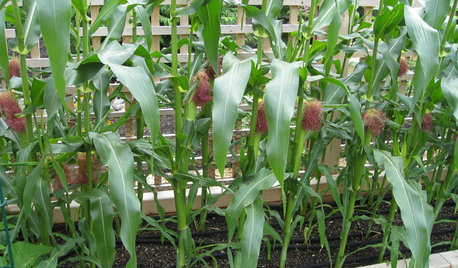Is cross-breeding even comparable to genetically modified?
mike758
10 years ago
Related Stories

COMMUNITYTogetherness Take 2: Is a Cohousing Community for You?
Missing that sense of connection? Consider the new breed of neighborhood with a communal bent
Full Story
EDIBLE GARDENSHow to Grow Your Own Sweet Summer Crops
This guide will help any gardener get started on growing the freshest warm-season veggies and berries for summer
Full Story
GARDENING FOR BUTTERFLIESGardening for the Bees, and Why It’s a Good Thing
When you discover how hard bees work for our food supply, you may never garden without them in mind again
Full Story
SUMMER FRUITS AND VEGETABLESHow to Grow Your Own Fresh, Sweet Corn
Here's how to plant and care for your own mini cornfield
Full Story
ARCHITECTURERoots of Style: See What Defines a Craftsman Home
Charming features and intimate proportions have made Craftsman houses an American favorite. See their common details and variations
Full Story
GROUND COVERSNative Alternatives to English Ivy, Japanese Pachysandra and Periwinkle
These shade-loving ground covers are good for the environment and say something about where you are
Full Story
PETSSo You're Thinking About Getting a Dog
Prepare yourself for the realities of training, cost and the impact that lovable pooch might have on your house
Full Story
LIFEWhy We Want a House With a Great View
Research shows that just looking at nature has powerful mental benefits. Here's how to get a boost — with or without a million-dollar view
Full Story
GARDENING GUIDESHow to Find the Right Native Plants for Your Yard
Find plant maps, sale sites and guides that make going native in the garden easier than ever
Full Story
HEALTHY HOMEWhat You Need to Know About Dust and How to Fight It
Breathe easier with these 10 tips for busting mites, dander and other microscopic undesirables
Full StoryMore Discussions







pnbrown
nc_crn
Related Professionals
Wrentham Landscape Architects & Landscape Designers · Byram Landscape Contractors · Kahului Landscape Contractors · North Richland Hills Landscape Contractors · Overland Park Landscape Contractors · Oxnard Landscape Contractors · Painesville Landscape Contractors · Rockwall Landscape Contractors · Saint John Landscape Contractors · Salmon Creek Landscape Contractors · Solana Beach Decks, Patios & Outdoor Enclosures · Elkridge Decks, Patios & Outdoor Enclosures · Draper Decks, Patios & Outdoor Enclosures · Richmond Decks, Patios & Outdoor Enclosures · Shirley Decks, Patios & Outdoor Enclosureseibren
gardengal48 (PNW Z8/9)
mike758Original Author
Kimmsr
lazy_gardens
albert_135 39.17°N 119.76°W 4695ft.
nc_crn
Kimmsr
pnbrown
nc_crn
pnbrown
henry_kuska
nc_crn
henry_kuska
nc_crn
Jonathan29
nc_crn
pnbrown
nc_crn
pnbrown
Kimmsr
little_minnie
pnbrown
lazy_gardens
Kimmsr
little_minnie
pnbrown
JoppaRich
Kimmsr
JoppaRich